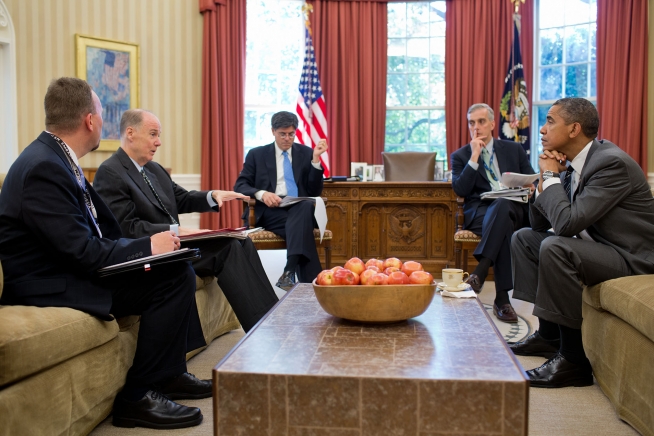One of the biggest problems (and there are many) with the Obama administration’s drone program is that it targets unidentified individuals, the vast majority of whom have not been shown to present any real threat to Americans. According to the recent academic study, Living Under Drones, the number of “high-level” targets killed as a percentage of total casualties is extremely low — about 2 percent. Much of the rest were deemed worthy to be bombed because, according to the unaccountable drone war operatives, they demonstrated a certain “pattern of life,” which drone operators could tell from a remote-control camera up in the sky is worth dying for.
 That’s what makes the administration’s new war plans for North Africa so troubling. The Washington Post:
That’s what makes the administration’s new war plans for North Africa so troubling. The Washington Post:
The White House has held a series of secret meetings in recent months to examine the threat posed by al-Qaeda’s franchise in North Africa and consider for the first time whether to prepare for unilateral strikes, U.S. officials said.
The deliberations reflect concern that al-Qaeda’s African affiliate has become more dangerous since gaining control of large pockets of territory in Mali and acquiring weapons from post-revolution Libya. The discussions predate the Sept. 11 attacks on U.S. compounds in Libya but gained urgency after the assaults there were linked to al-Qaeda in the Islamic Maghreb, or AQIM.
How much did we hear about the AQIM threat prior to the discretionary air war on Libya that started in March of last year? The instability and flood of Islamic extremists in Mali, apparently a focal point of the supposed AQIM threat, is itself a direct consequence of US interventionism in Libya. As the Post even explains, “the overthrow of dictator Moammar Gaddafi in Libya triggered a migration of African mercenaries and their weapons back to countries where al-Qaeda elements are based.”
Other “threats” in Africa, like the Nigerian Boko Haram or the al-Shabab network in Somalia are inflated threats that don’t seem to be able to make an impact in their own countries, never mind attack this one. The current policies are apt to come back to bite us, given the US-sponsored invasion of Somalia by Ethiopia in 2006 that helped give rise to the militant group al-Shabaab – now ironically justifying current interventions. Oddly, even the Obama administration has quietly acknowledged the fact that their military involvement in Somalia may create more problems than it solves, with one administration official telling the Washington Post in December there is a “concern that a broader campaign could turn al-Shabab from a regional menace into an adversary determined to carry out attacks on U.S. soil.”
So the Obama administration is currently debating whether to dramatically expand the drone war, or to use African proxy forces to do our fighting for us:
U.S. officials said the discussions have focused on ways to help regional militaries confront al-Qaeda but have also explored the possibility of direct U.S. intervention if the terrorist group continues unchecked…officials have begun to consider contingencies, including the question of “do we or don’t we” deploy drones.
Through the Pentagon’s Africa Command, the US is training and equipping militaries in countries including Algeria, Burkina Faso, Chad, Mali, Mauritania, Morocco, Niger, Nigeria, Senegal and Tunisia in the name of preventing “terrorists from establishing sanctuaries.” The strategy appears irreconcilable with recent history, however, given the US-sponsored invasion of Somalia by Ethiopia in 2006 gave rise to the militant group al-Shabaab – now ironically justifying current interventions.
The strategy, which is beginning to span an entire continent, indicates a desire on the part of the national security establishment to avoid the high costs of thousands of occupation forces and lengthy nation building projects. Instead, military support to undemocratic regimes, dangerous proxy wars, drones, and covert military missions with a light footprint rule the day in America’s approach to Africa.
In other words, it is a strategy outside the jurisdiction of Congress and without the knowledge of the American people. Such strategies have led to tyranny, death, and blowback in the past. And there isn’t much indication it will be any different this time.


